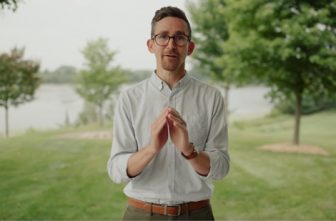
When I was in seminary, part of my formation was volunteering with the chaplaincy office at the Veterans Affairs hospital. I would visit with Catholic patients, most of whom were no longer practicing their faith.
When we’d get to discussing why this person wasn’t practicing, it struck me that, almost without fail, the reason wasn’t because they disagreed intellectually with any particular Church teaching. Instead, someone who represented Catholicism in their life — a parent, a teacher, a priest — had treated them poorly, and had effectively been a counter witness to the truth, goodness and beauty of the Gospel.
This experience underscored the importance of being pastoral — of being kind, of being solicitous, of knowing how and when to broach a difficult subject. The end goal, after all, isn’t to “speak truth to power.” Instead, it’s for the listener to receive the Gospel. Presenting it in a way that others can receive it is therefore crucial for effective evangelization.
Because of this truth of human communication, current Catholic discussions rightfully place a great premium on being pastoral. In Africa, for instance, there is renewed focus on how to effectively engage with Catholics who are in polygamous relationships. As Cardinal Fridolin Ambongo, head of the African bishops symposium, recently said, “affirming the doctrinal elements is not enough. Pastoral accompaniment for polygamists is urgently needed.”
In the West, discussion of pastoral accompaniment also tends to focus on groups whose sexual behavior might place them at odds with the Church’s moral teaching, such as people in same-sex relationships, cohabitating couples, and divorced and remarried persons.
Pastoral accompaniment — meeting people where they’re at, especially in our broken and confused culture — is of the utmost importance. It isn’t some weak-kneed, modernist compromise, but is instead done in imitation of Jesus Christ, the good shepherd who goes out in search of the lost sheep, stranded in the spiritual and existential peripheries, and whose loving outreach is itself a testament to the truth of the message he bears.
However, it also strikes me that we can speak about pastoral accompaniment, and even engage in it, in a way that actually undermines what it’s all about. We do this when we treat pastoral practice — being kind to someone, remaining on good terms with them, not offending them — as the “be all end all” of Christian witness.
Consider how Christ ends the parable of the lost sheep, cited above. The shepherd doesn’t simply stay with the lost sheep out in the wilderness. Instead, he “sets it upon his shoulders with great joy” and goes home.
Pastoral accompaniment fails if it isn’t clearly aimed at “going home” — if it remains on some sort of road to nowhere.
If one error is to speak “truth to power” without regard for how the recipient might receive what we say, the other extreme is to focus on not ruffling any feathers at the expense of sharing the truth, and, ultimately, the other’s salvation.
After all, Jesus Christ is the good shepherd not only because he looks at us with love, but because “in green pastures he makes me lie down; to still waters he leads me,” as Psalm 23 tells us.
The green pastures and the still waters that Christ leads us to are nothing other than relationship with God. And because God is our creator, being in right relationship with him encompasses all of us — including how we live and even how we express something like our sexuality.
The moral teachings of the Church are not optional “add-ons.” They flow from the very salvation that Christ offers us, a salvation that doesn’t merely promise a ticket to heaven but provides us with the grace and the blueprint to flourish here below. Any pastoral plan needs to be rooted in, and certainly not avoidant of, these moral truths.
This was brought home for me while listening to the Gospel reading from this past Sunday (Oct. 6). In the reading from Mark, Christ is unmistakably clear and emphatic that divorce is not part of God’s plan for marriage. “Therefore, what God has joined together, no human being must separate.” Christ even says that someone who divorces their spouse and marries another commits adultery.
As the son of divorced parents, I know that this teaching is hard. But if we are truly going to lead people to green pastures and still waters, there is simply no way around it. This is what God incarnate has told us about the nature of marriage. Who are we to ignore it?
Living consistent with the teachings of Christ and his Church is the home that we are always called to bring others toward. This destination can never slip from our minds amid our pastoral accompaniment — and if it does, then we are no longer being genuinely pastoral.
Because the Good Shepherd doesn’t leave people stranded. “He guides me along right paths for the sake of his name.” And we, as participants in Christ’s salvific mission, are called to do the same.
Liedl lives in South Bend, Indiana, and is senior editor for the National Catholic Register. He is a former longtime resident of the Archdiocese of St. Paul and Minneapolis, alum of the University of St. Thomas’ Catholic Studies graduate program and a current student at The St. Paul Seminary and School of Divinity, both in St. Paul.



